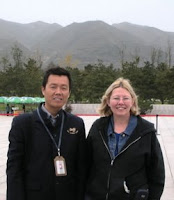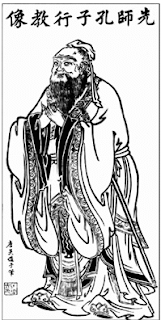
Here you go.
Pardoning the Turkey.
Long live West Wing.



 I have taken an extra day off from work before the Thanksgiving holiday, and Boulder has received its first real snowfall of the season.
I have taken an extra day off from work before the Thanksgiving holiday, and Boulder has received its first real snowfall of the season.M and I had a brief but fervent argument the other day about the author of the above poem. He said it was Robert Frost (hah!); I knew that it was Ezra Pound due to my excellent education in English literature at Indiana University hundreds of years ago. During this discussion at Heidi's Brooklyn Deli on Pearl Street, I ended up proving that I was right with a brief Internet search using my Blackberry. I am particularly proud of this small victory because M has given me no end of grief over the years for somehow earning a degree in English without ever reading Melville's Moby Dick cover to cover (which he believes to be the finest American novel ever written – global before its time, yada yada). I have tried. But I can’t seem to get past the endless chapter in which water flowing from mountain springs, down creeks and streams, into rivers, and eventually into the vastness of the ocean, is described in detail as yet unmatched in all my subsequent literary perusals.
To see the radical difference between the poets, I recommend reading Robert Frost’s wonderful poem, much preferred in tone to Ezra’s, and one I quote frequently:
A statue of Robert Frost sits in front of the Old Main building on the University of Colorado campus. Once, CU was doing some construction work around the statue and put up a
M has headed out to shovel our sidewalk and buy last-minute Thanksgiving supplies at King Soopers – and I have informed him that I will be blogging about his gross literate error. This has earned me the title “Evil Bloghead.”
I am indeed looking forward to the holiday, and the snow is welcome; it gives me a cozy feeling as I sit here typing away by the window. Oddly enough, "Winter is icumen in" also has always given me a cozy feeling – something about the inevitability, and therefore comfort, of the seasons. Not what Ezra had in mind, I am guessing.
 In the second season of the television show Heroes, a major theme continues to be memories: “Memories are what make us human.” One hero has lost his memory. Another can steal memories. A third character is threatened with the horror of having his happiest memories obliterated: the day he met his wife, his wedding day, the memories of a daughter who has died.
In the second season of the television show Heroes, a major theme continues to be memories: “Memories are what make us human.” One hero has lost his memory. Another can steal memories. A third character is threatened with the horror of having his happiest memories obliterated: the day he met his wife, his wedding day, the memories of a daughter who has died.
In the movie Vanilla Sky, the main character David, after several perplexing experiences, ends up realizing that he has willingly given up terrible memories to live a “Lucid Dream,” but like any technology, this one is has glitches and he is left to the mercy of “Tech Support.”
Yes, memory is a two-edged sword. You may wish to expunge terrible (or merely mortifying) memories, but what will the unintended consequences be? And who would we be without our memories? One of the greatest fears as we age is that our memory will fade.
Memory and thoughts have an enormous impact on state of mind and well being. As I read more about meditation and mindfulness I’m noticing how much of the time my mind can be seized by images, earworms and whole trains of thinking that are trivial, painful, obsessive, repetitive, unproductive.
It is like suddenly noticing a background sound that has gradually increased to the point of a dull roar; as it finally reaches your consciousness it is suddenly excruciating.
Often my attempts at meditation remind me of a birds trapped indoors, battering themselves against the daylight from outside windows, trying to get free. Past memories that bring sorrow, future fears that bring anxiety. It is amazing how difficult it can be to focus on the here and now.
 Another sight I saw while visiting China was the Hua Qing Hot Springs at the foot of Mount Lishan about 40 minutes outside Xi’an. Many stories are told about these hot springs and their usage by emperors throughout China’s history, as well as a more recent altercation in which Chiang Kai-shek was captured there. A young
Another sight I saw while visiting China was the Hua Qing Hot Springs at the foot of Mount Lishan about 40 minutes outside Xi’an. Many stories are told about these hot springs and their usage by emperors throughout China’s history, as well as a more recent altercation in which Chiang Kai-shek was captured there. A young  woman who I hired as my guide for a quick tour told the story and pointed out the bullet holes in the window and wall.
woman who I hired as my guide for a quick tour told the story and pointed out the bullet holes in the window and wall.
 Another place I had a chance to visit while in Xi’an, China recently was the Great Wild Goose Pagoda. It is surrounded by beautiful gardens and many statues of Buddha. It was built in 652 during China’s Tang Dynasty.
Another place I had a chance to visit while in Xi’an, China recently was the Great Wild Goose Pagoda. It is surrounded by beautiful gardens and many statues of Buddha. It was built in 652 during China’s Tang Dynasty. e golden Buddha and people were waiting in line to kneel before the statue. In a building nearby there were many niches with Buddhas deep inside, shining golden or
e golden Buddha and people were waiting in line to kneel before the statue. In a building nearby there were many niches with Buddhas deep inside, shining golden or  glowing with blue backlight in the darkness, cushions at each station for those who wished to meditate or pay respects.
glowing with blue backlight in the darkness, cushions at each station for those who wished to meditate or pay respects.

 aveled on business to Xi’an, China and Singapore. My first full day in China was on Sunday so I took a tour.
aveled on business to Xi’an, China and Singapore. My first full day in China was on Sunday so I took a tour. some saddled for the soldiers and some to pull chariots. Bronze arrows, shields, horses and chariots were also buried at the site, as well as other artwork including bronze cranes and other water birds.
some saddled for the soldiers and some to pull chariots. Bronze arrows, shields, horses and chariots were also buried at the site, as well as other artwork including bronze cranes and other water birds. Now the Chinese people are unearthing and painstakingly restoring them. They stand in row upon row in the earthen holes. The original statues had color as well, but the Chinese quickly discovered that once they were unearthed and exposed to the air, the color faded. A display shows what some of them looked like before fading.
Now the Chinese people are unearthing and painstakingly restoring them. They stand in row upon row in the earthen holes. The original statues had color as well, but the Chinese quickly discovered that once they were unearthed and exposed to the air, the color faded. A display shows what some of them looked like before fading. nglish, Liu Hong Jun, and he took me through the beautiful gardens with pomegranate and persimmon trees surrounding the site and to view the three separate excavation pits in various stages of restoration. It was a chilly fall day in China and the air was clearer here than in Xi’an itself which has quite a thick and murky atmosphere, the kind that makes your chest hurt a little bit after awhile.
nglish, Liu Hong Jun, and he took me through the beautiful gardens with pomegranate and persimmon trees surrounding the site and to view the three separate excavation pits in various stages of restoration. It was a chilly fall day in China and the air was clearer here than in Xi’an itself which has quite a thick and murky atmosphere, the kind that makes your chest hurt a little bit after awhile. often having them killed. In the end his efforts to live forever were futile. Confucius said:
often having them killed. In the end his efforts to live forever were futile. Confucius said: